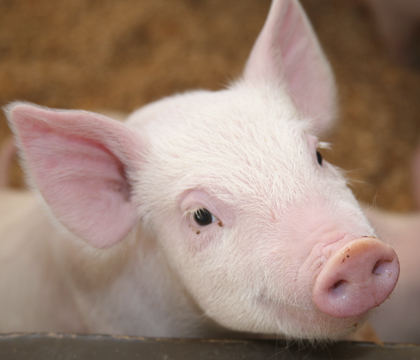
Livestock disease research gains funding
Agriculture and Agri-Food Canada's AgriInnovation Program has allocated $260,000 to the Saskatchewan Pork Development Board (Sask Pork) to help control two diseases that threaten swine and beef herds in Canada.
By WCVM Today
The research will target Brachyspira hampsonii, a recently discovered bacterium that causes diarrhea and colitis in young pigs. B. hampsonii is known to affect the animals' feeding and growth rate.
Scientists will also seek to gain a better understanding of bovine genital campylobacteriosis (BCG) or "vibriosis" that can significantly reduce pregnancy rates among breeding cattle. A recent outbreak of BCG in a Saskatchewan beef herd significantly reduced pregnancy rates.
"Brachyspira hampsonii is an emerging swine disease in Western Canada which needs to be better understood and controlled because it is very hard to eliminate from a herd when infected," said Florian Possberg, chair of Sask Pork.
"BCG also has the potential to seriously reduce the calf crop in the important western cattle herd, so we welcome the AgriInnovation Program funding to develop products to control these serious threats."
Sask Pork will have input from the Saskatchewan Cattlemen's Association and the research will be conducted by a team of scientists at the Western College of Veterinary Medicine (WCVM). Both studies will include diagnostics, surveillance and trials involving live animals.
This investment is made through the Industry-led Research and Development stream of Agriculture and Agri-Food Canada's AgriInnovation Program, a five-year program under Growing Forward 2 that can provide up to $698 million for projects.
Related stories:
Scientists will also seek to gain a better understanding of bovine genital campylobacteriosis (BCG) or "vibriosis" that can significantly reduce pregnancy rates among breeding cattle. A recent outbreak of BCG in a Saskatchewan beef herd significantly reduced pregnancy rates.
"Brachyspira hampsonii is an emerging swine disease in Western Canada which needs to be better understood and controlled because it is very hard to eliminate from a herd when infected," said Florian Possberg, chair of Sask Pork.
"BCG also has the potential to seriously reduce the calf crop in the important western cattle herd, so we welcome the AgriInnovation Program funding to develop products to control these serious threats."
Sask Pork will have input from the Saskatchewan Cattlemen's Association and the research will be conducted by a team of scientists at the Western College of Veterinary Medicine (WCVM). Both studies will include diagnostics, surveillance and trials involving live animals.
This investment is made through the Industry-led Research and Development stream of Agriculture and Agri-Food Canada's AgriInnovation Program, a five-year program under Growing Forward 2 that can provide up to $698 million for projects.
Related stories:
